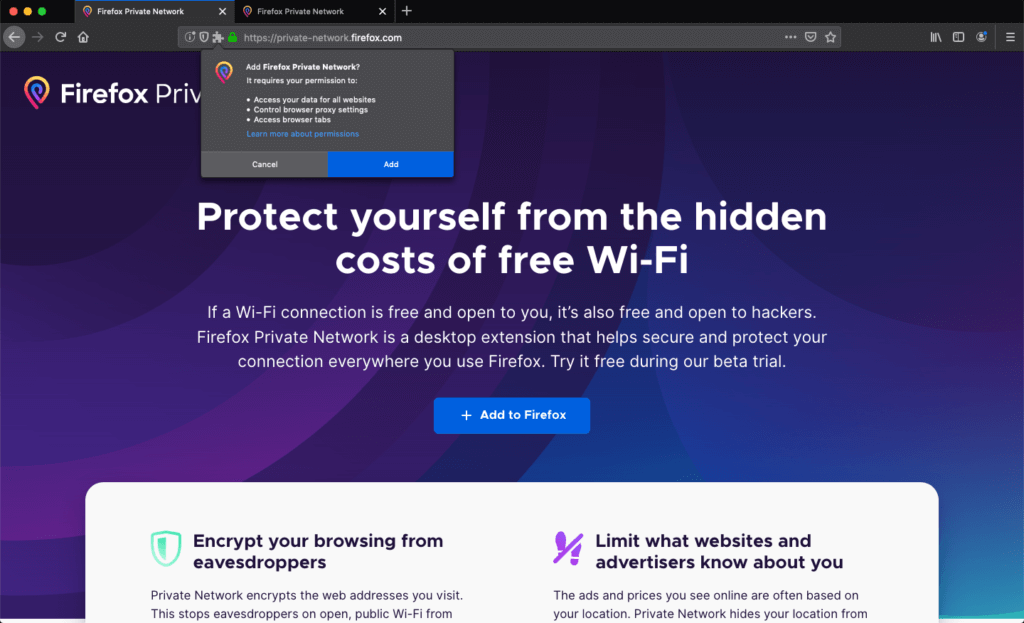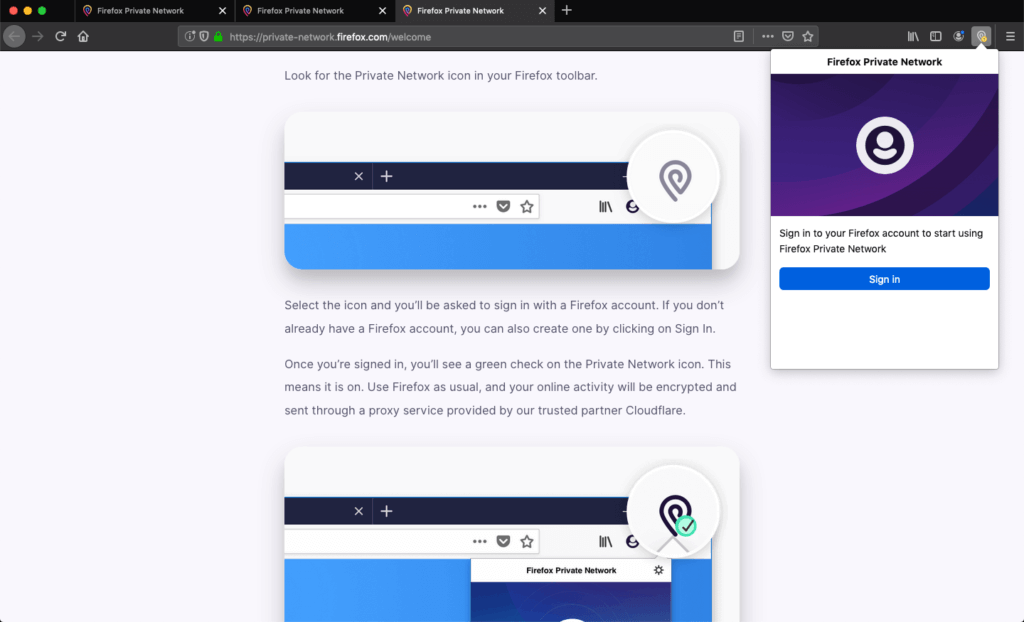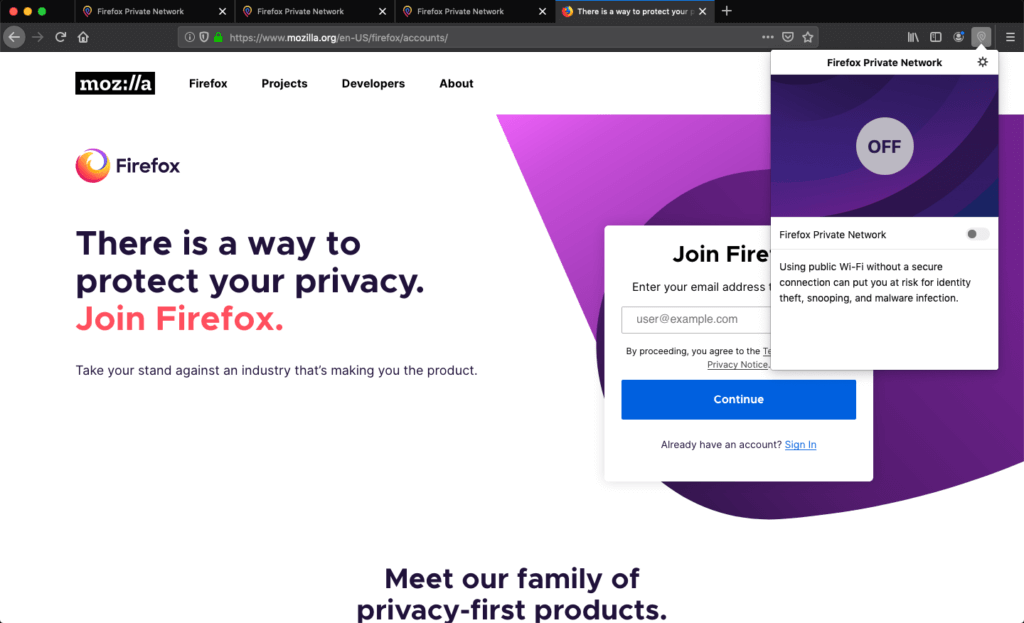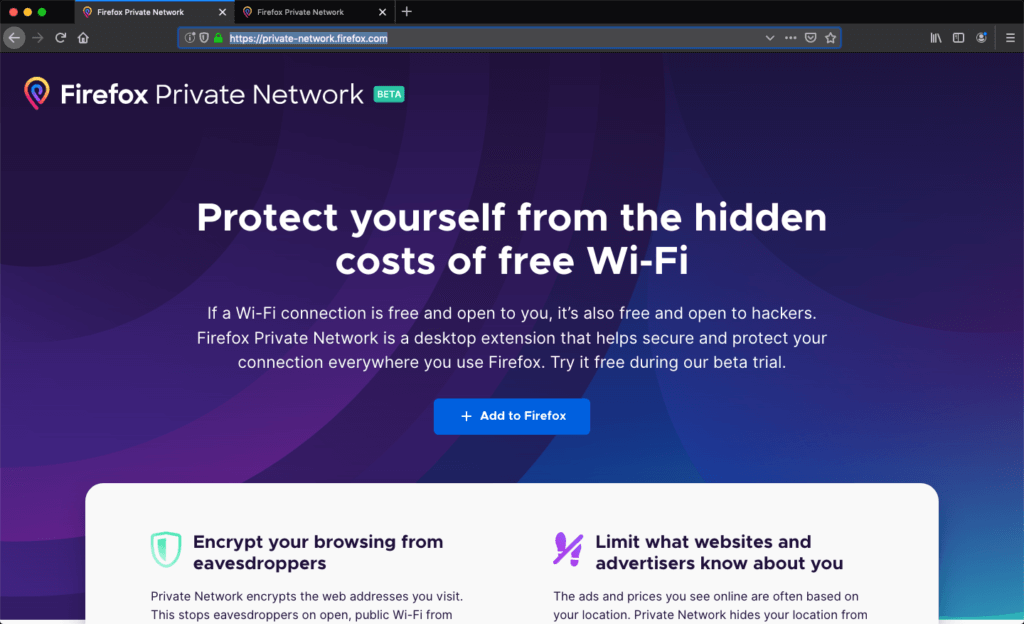Mozilla’s Firefox browser has been one of the most popular Internet browsers in the world for years now. It’s free, open-source and frequently updated, and it’s not owned and operated by any of the major tech companies.
Regular people and technology-savvy power users alike can benefit from its features. But with increasing emphasis on online privacy, Mozilla has spent its time trying to refine a set of privacy tools for Firefox.
They turned to well-known network company Cloudflare to put together a solution that would help regular people everywhere browse the Internet safely and privately. And with the release of its Firefox Private Network extension, the Firefox browser has taken a big leap forward for Internet privacy.
What Is It?
To understand what the Firefox Private Network extension is, you first have to understand a little bit about how the Internet works. Think of the Internet like a vast city, filled with houses, businesses and paved streets. When you open a browser, you’re getting in your car and going for a drive from place to place—getting from point A to point B is fairly easy.
But doing it privately … that becomes hard.
Because in this city, there aren’t really any secrets. Anyone who wants to spy on you can. Anywhere you go in that city, there are cameras trained on your every move from retailers, government authorities, ad networks and more. And they’re packaging the information about your browsing habits and using it themselves or selling it to the highest bidder.
Most of this surveillance is ostensibly benign. It’s Amazon trying to figure out just what your buying habits are so it can give you better recommendations, or Google generating a user profile, or Facebook gathering data to keep your timeline straight.
But not everyone is comfortable being tracked everywhere they go …
Even beyond that, connecting to most public Wi-Fi networks is a rough proposition. Many public Wi-Fi networks are extremely easy to use if you want to inject something into someone’s Internet.
Bad actors can infiltrate your favorite bars, coffee shops, restaurants, your child’s school, your job … you name it, if you log onto public Wi-Fi, you’re taking a significantly higher risk of someone poking their nose in where it doesn’t belong.
If you really want to browse privately, it takes some work—that’s where a VPN comes in.
A virtual private network, or VPN, is a network within a network. In the city analogy, instead of riding around the city in a regular car, you’re in a limousine with blacked-out windows. Your IP address is hidden and any connections you make are encrypted and private. When you connect over public Wi-Fi, you’re safe, and your Internet browsing isn’t instantly traceable to you.
Using a VPN will keep targeted advertising from getting a fix on your preferences easily. It will also protect your devices from prying eyes. While putting a browser in private or incognito mode will keep it from storing details on browsing locally, it doesn’t stop the Internet provider or other entities from tracking your traffic if they want to follow by IP.
With the Privacy Network extension, a VPN is easily available to everyone.
Mozilla’s Big Play
With privacy being in the news so much, it looks like Mozilla has decided to make a play for its chunk of the VPN business. Just look at the New York Times’s online privacy page—there’s new news every week about some tech company or government overstepping its bounds.
One week it’s Google getting fined $170 million for its privacy practices with children on YouTube, another week it’s Facebook embroiled in a $5 billion settlement.
A few years ago Edward Snowden was just a fresh-faced young CIA man and now he’s living in Russia after blowing the whistle on America’s internal internet surveillance. Privacy is top of mind for a lot of people, and smart tech companies are wising up.
At the moment the Private Network extension is being offered free to US users, but most VPN services charge money to their users. It’s expensive to maintain servers around the world, after all. Mozilla will likely be no different.
Mozilla’s Private Network extension is in beta (pre-release) and free for anyone who wants it. If you’ve been worried about privacy, now is the time to try it out.
How to Get the Firefox Private Network Extension
To get the Private Network extension, if you don’t have Firefox already,
- You’ll first have to download and install it, which is a quick and painless process.
- After it’s installed, navigate to the Private Network page.
- Click on the blue “Add to Firefox” button in the middle of the page. Depending on what device you’re using, the dialog boxes might look slightly different, but the process will be the same.
- You’ll see a little popup window that asks you if you’re sure you want to do this.
- Click “Add” to finish installation.

That’s it. You’ve installed the extension. But there’s still some work to do.
If you don’t yet have a Firefox account, it’s time to make one. On the upper right of your Firefox window you’ll see a little tiny curlicue icon. Click on it. It will ask you to sign in to your Firefox account.

To make a Firefox account,
- You can either click on “Sign In” and follow the new account process
- or you can follow this link to create an account.
- Then once you’ve created the account, enter the information in at the window you get when you click the curlicue.
When you’ve done it right, Firefox will save the information and you can easily toggle Private Network on and off. Just click the little toggle in the middle right of the small window (just to the right of “Firefox Private Network” and the symbol will turn from “OFF” to “ON.”

Just like that, you’re protected.
What Your New VPN Can (and Can’t) Do
Mozilla’s VPN is a great tool for anyone who wants a little bit of extra protection on the Internet, but it’s not a panacea. There are certain things it can do well and certain things it can’t.
If you want to get up to anything really nefarious (don’t do it), the VPN won’t help you much. Governments can often get to VPNs if they really want to, either by owning the nodes at either end or by leaning on the VPN provider.
It’s not meant for anything that heavy-duty. Which is good, since you shouldn’t be doing anything that would bring down that kind of attention anyway.
Your VPN connection doesn’t mean Firefox won’t save your history, either. You’d have to go into private browsing mode to cut that out. Firefox will also collect generic data for testing purposes.
It won’t send information on the websites you visit to Mozilla, but it will send information about how much you use the extension and technical information on how it functions or interacts with your computer and other programs. If you really don’t want to send any data at all it is possible to opt out completely.
Since this particular VPN is tied to your browser, it also won’t encrypt other communications or connections. Normal VPNs often will, but browser-based solutions like Firefox Private Network or Tor Browser only send web browsing done on that particular browser. Email, online gaming, instant messaging and other Internet activity will still be sent out in the clear.
This extension will, however, come in handy any time you’re connecting to public Wi-Fi. It’s currently only usable by regular computers, not iOS or Android devices, though that may change. If you’re in the habit of taking your laptop to the coffee shop, this could come in extremely handy.
Any time you’re doing something that might involve trackers, this extension will come in handy too. For example, airline companies will often bump up prices if they already know from their monitoring that you’re looking for airline tickets.
Using this extension will keep them guessing so they can’t haggle you up. And if you’re tired of Amazon somehow knowing exactly what you want to purchase before you purchase it—or you want to do a little shopping without leaving a trace in either the history or the targeted ads, say for a birthday or holiday—this is the perfect way to do it.
Privacy matters, and if you’ve been worried about the increasing tracking that’s infested every corner of the Internet, it’s time to take advantage of the Private Network extension. Mozilla’s taking a gamble that people will enjoy their service so much that they’ll be willing to pay for it once the beta testing period is over. Are you one of these people?
If you are, don’t delay. Go download the extension—it’ll only take a couple of seconds. Sign into your Firefox account. Then turn on your VPN. You’ll be able to browse wherever you like for as long as you’d like without worrying about trackers or any type of surveillance at all. It’s the better way to experience the Internet.
As always, if you’re having any difficulty with getting the extension up and running, feel free to reach out to our HelpCloud technicians for remote support and we’ll help you get it resolved.

